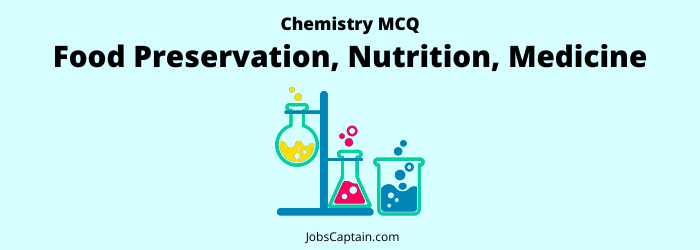
Question 1. Which one of the following is used in food preservation?
(A) Sodium Carbonate
(B) Acetylene
(C) Benzoic Acid
(D) Sodium Chloride
Question 2. Refrigeration helps in food preservation by______.
(A) Sealing the food with a layer of ice
(B) Destroying enzyme action
(C) Reducing the rate of biochemical reactions
(D) Killing the germs
Question 3. Which one of the following substances is used in the preservation of food stuff?
(A) Sodium Chloride
(B) Sodium Benzoate
(C) Potassium Chloride
(D) Citric Acid
Question 4. For the preservation of fruit juice which of the following is used _________.
(A) Sodium Benzoate
(B) Sulphuric acid
(C) Formic acid
(D) Acetic acid
Question 5. Which of the following is a common refrigerant used in the domestic refrigerator?
(A) Neon
(B) Freon
(C) Oxygen
(D) None of these
Question 6. Charcoal which is used in decolouring raw sugar is______.
(A) Coconut charcoal
(B) Animal charcoal
(C) Sugar charcoal
(D) Wood charcoal
Question 7. The main component of honey is _____.
(A) Fructose
(B) Maltose
(C) Sucrose
(D) Glucose
Question 8. Aspartame is an artificial sweetener sold in the market. It consists of amino acids and provides calories like other amino acids. Yet, it is used as a low calorie sweetening agent in food items. What is the basis of this use?
(A) Aspartame is as sweet as table sugar, but unlike table sugar, it is not readily oxidized in the human body due to lack of requisite enzymes
(B) When aspartame is used in food processing, the sweet taste remains, but it becomes resistant to oxidation
(C) Aspartame is as sweet as sugar but after ingestion into the body, it is converted into metabolites that yield no calories
(D) Aspartame is several times sweeter than table sugar, hence food items made with small quantities of aspartame yield fewer calories on oxidation
Question 9. Aspirin is obtained from ______.
(A) Chemical reaction of acids
(B) A tree
(C) Earth
(D) Petroleum
Question 10. Aspirin is ______.
(A) Antibiotic
(B) Reliever
(C) Antipyretic
(D) None of the above
Question 11. Which one of the following compounds is used as a sedative?
(A) Phosphorus Trichloride
(B) Ethyl Alcohol
(C) Calcium Chloride
(D) Potassium Bromide
Question 12. Which one of the following forms an irreversible complex with a haemoglobin of the blood?
(A) A mixture of Carbon Dioxide and Helium
(B) Carbon Monoxide
(C) Pure Nitrogen gas
(D) Carbon Dioxide
Question 13. Milk is an example of _____.
(A) A suspension
(B) An emulsion
(C) A foam
(D) A gel
Question 14. Which of these is not a colloid?
(A) Honey
(B) Ice cream
(C) Blood
(D) Milk
Question 15. Milk is homogenized by _____.
(A) Boiling only
(B) Breaking down fat particles to the microscopic size with the help of centrifuge
(C) Removing its fat
(D) Adding a little sodium carbonate
Question 16. Milk openly placed for sometime becomes sour due to _____.
(A) Acetic acid
(B) Citric acid
(C) Lactic acid
(D) Carbonic acid
Question 17. Which one of the following acids is present in sour milk products?
(A) Lactic acid
(B) Tartaric acid
(C) Butyric acid
(D) Acetic acid
Question 18. Which one of the following acids, is formed during the change of milk into curd?
(A) Lactic acid
(B) Citric acid
(C) Ascorbic acid
(D) Acetic acid
Question 19. Curd making is an ancient ‘Biotechnological’ process involving _____.
(A) Protozoa
(B) Fungus
(C) Virus
(D) Bacteria
Question 20. Which of the following oil is an extract of clove oil?
(A) Benzayldehyde
(B) Methenol
(C) Eugenol
(D) Methenol
Question 21. Which one of the following fruits is most suitable for jelly making?
(A) Wood apple
(B) Gauva
(C) Papaya
(D) Mango
Question 22. Organic food is supposed to be better for us because it _____.
(A) Is grown without the use of artificial fertilizers and pesticides
(B) Is grown in glasshouses keeping it clean of environmental pollutants
(C) Is more expensive to buy
(D) Relies on chemicals to improve the flavour
